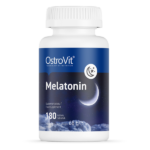Is Melatonin Safe During Pregnancy?

For many women, sleep can be evasive during pregnancy. Physical discomfort, changing hormones, and excitement and anxiety about being a new mother lead to a host of sleep problems. In fact, it’s believed that at least 50 percent of pregnant women suffer from insomnia.
Women can experience insomnia during all stages of pregnancy, but it tends to be more common in the first and third trimesters. Between midnight bathroom breaks, out-of-control hormones, and pregnancy woes such as congestion and heartburn, you might be spending more time out of your bed than in it. The good news: While insomnia might be miserable, it’s not harmful to your baby.
Why does sleep change during pregnancy?
According to the sleep foundation, a multitude of factors leads to insomnia during pregnancy. Beginning in the first trimester, fluctuating hormone levels cause generalized discomfort and other problems that can make it difficult to fall asleep and stay asleep. These may include:
• Nausea
• Vomiting
• Breast tenderness
• Increased heart rate
• Shortness of breath
• Higher body temperature
• Frequent nighttime urination
• Leg cramps
As time wears on, expectant mothers may also experience back pain and have trouble finding a comfortable position to accommodate the growing baby bump, especially when the baby starts to kick at night. Anxiety about the upcoming labor, being a new mother, juggling work and home responsibilities, or other worries may keep your mind racing at night. In the third trimester, many pregnant women experience vivid, disturbing dreams that can further impair sleep quality.
While it’s common for most pregnant women to experience at least a few of the above symptoms, sometimes they may be related to a sleep disorder. Sleep disorders can be linked to further problems down the line for mother or baby, so it’s important to talk to your doctor if you’re experiencing any symptoms.
What is melatonin and how does it work?
Melatonin is a hormone that your brain produces in response to darkness. It helps with the timing of your circadian rhythms (24-hour internal clock) and with sleep. Being exposed to light at night can block melatonin production. Research suggests that melatonin plays other important roles in the body beyond sleep. However, these effects are not fully understood.
Melatonin dietary supplements can be made from animals or microorganisms, but most often they’re made synthetically. The information below is about melatonin dietary supplements.
What are the health benefits of taking melatonin?
Melatonin supplements may help with certain conditions, such as jet lag, delayed sleep-wake phase disorder, some sleep disorders in children, and anxiety before and after surgery.
Jet lag: Jet lag affects people when they travel by air across multiple time zones. With jet lag, you may not feel well overall and you may have disturbed sleep, daytime tiredness, impaired functioning, and digestive problems.
Research suggests that melatonin supplements may help with jet lag. This is based on medium-sized reviews from 2010 and 2014.
- Four studies that included a total of 142 travelers showed that melatonin may be better than a placebo (an inactive substance) in reducing overall symptoms of jet lag after eastward flights. Another study of 234 travelers on eastward flights looked at only sleep quality and found low-quality evidence that melatonin may be better than placebo for improving sleep quality.
- Two studies that included a total of 90 travelers showed that melatonin may be better than a placebo in reducing symptoms of jet lag after westward flights.
Delayed sleep-wake phase disorder (DSWPD)
People with DSWPD have trouble falling asleep at the usual times and waking up in the morning. They typically have difficulty getting to sleep before 2 to 6 a.m. and would prefer to wake up between 10 a.m. and 1 p.m.
Melatonin supplements appear to help with sleep in people with DSWPD, but it’s uncertain whether the benefits outweigh the possible harms. This is based on a clinical practice guideline, a small review, and a more recent study.
- In 2015, the American Academy of Sleep Medicine recommended melatonin supplements given at specific times for DSWPD. The recommendation was a weak one, and it came with uncertainty about whether the benefits of melatonin outweigh its potential harms.
- A 2016 review that looked at a small number of people (52) from two studies showed that melatonin supplements reduced the time it took for people with DSWPD to fall asleep when compared to placebo. On average, it took about 22 minutes less for them to fall asleep.
- A 2018 randomized controlled trial that lasted 4 weeks and included 307 people with DSWPD found that taking melatonin 1 hour before the desired bedtime combined with going to bed at a set time led to several improvements. Those improvements included falling asleep an average of 34 minutes earlier, better sleep during the first third of the night, and better daytime functioning.
Some sleep disorders in children
Sleep problems in children can have undesirable effects on their behavior, daytime functioning, and quality of life. Children with certain conditions, such as atopic dermatitis, asthma, attention-deficit hyperactivity disorder (ADHD), or autism spectrum disorder (ASD), are more prone to sleep problems than other children.
There are no overall guidelines on the best approach to improving sleep in children. However, guidelines for specific conditions recommend behavioral treatments, such as good bedtime habits and parent education, as an initial treatment that may be supplemented with medicines.
A 2019 review looked at 18 studies of melatonin supplements that included a total of 1,021 children. Most of the studies were small, and all were relatively brief (1 to 13 weeks). Overall, the studies showed that melatonin was better than placebo for improving both the time to fall asleep and total sleep. The effects of melatonin on behavior and daytime functioning, however, weren’t clear because the studies used different ways to measure these outcomes.
The list below shows the review’s results on melatonin short-term effects for children with specific conditions.
- Children with ASD fell asleep 37 minutes earlier and slept 48 minutes longer.
- Children with ADHD fell asleep 20 minutes earlier and slept 33 minutes longer.
- Children with atopic dermatitis fell asleep 6.8 minutes earlier and slept 35 minutes longer.
- Children with chronic sleep-onset insomnia fell asleep 24 minutes earlier and slept 25 minutes longer.
Because there aren’t many studies on children and melatonin supplements, there is a lot we don’t know about the use of melatonin in children. For example, there are uncertainties about what dose to use and when to give it, the effects of melatonin use over long periods of time, and whether melatonin’s benefits outweigh its possible risks. Because melatonin is a hormone, it’s possible that melatonin supplements could affect hormonal development, including puberty, menstrual cycles, and overproduction of the hormone prolactin, but we don’t know for sure.
Because of these uncertainties, it’s best to work with a health care provider if you’re considering giving a child melatonin for sleep problems.
Is Melatonin Safe During Pregnancy?
No, pregnant people should not take melatonin supplements because it can entrain a circadian rhythm in a fetus, which could potentially impact the baby’s sleeping patterns after birth. Melatonin may also affect neurological development in a fetus, reducing the likelihood of problems such as brain lesions. According to an article by sleep foundation, naturally occurring melatonin appears to play a role in pregnancy, although more research is needed to fully understand how the hormone operates in this context. A pregnant woman’s melatonin can cross the placenta and bind to receptors in a fetus, suggesting melatonin levels impact an unborn baby. Additional melatonin may also be produced locally within the placenta. Melatonin levels in a placenta are highest during the first trimester. A pregnant woman’s melatonin levels increase after 24 weeks of pregnancy and again at 32 weeks.
Researchers are looking into whether or not melatonin supplementation may help reduce the risk of a fetus developing neurological disorders such as cerebral palsy. If melatonin can help, then it might be recommended to women at risk of preterm birth in the future. However, melatonin supplementation has not been confirmed to help and is not currently recommended for this purpose.
Can I take melatonin during pregnancy?
Currently, there isn’t enough research to confirm that taking melatonin supplements while pregnant is safe. Experts don’t recommend melatonin for insomnia, the sleep issue most commonly faced by pregnant women. Rather, melatonin has been found to usefully treat jet lag, delayed sleep-wake phase disorder, some sleep disorders in children, and anxiety before and after surgery.
In certain instances, however, healthcare professionals may recommend melatonin to pregnant women or women trying to become pregnant. For example, some professionals recommend melatonin supplements for older women trying to become pregnant and for pregnant women with preeclampsia. Studies suggest melatonin might also be useful for women with endometriosis.
In pregnant women without a documented health issue known to be associated with low melatonin levels, supplementation might not be a good idea. Melatonin levels naturally rise throughout pregnancy. One potential risk of supplementing with melatonin during this time could be too much melatonin in the body.
Researchers haven’t conducted much research on the safety of melatonin supplements in healthy pregnant women. In an animal study of pregnant rats, melatonin supplementation negatively impacted litter size, as well as the growth and mortality rates of the pups. However, we don’t know if these results can be generalized to humans.
If you’re pregnant and experiencing insomnia, melatonin supplementation may not be the best course of action. Instead, cognitive behavioral therapy for insomnia (CBT-I) and improved sleep hygiene might help. If you’re older and trying to get pregnant, or pregnant and facing preeclampsia, consult with your doctor before trying melatonin supplementation.
Conclusion
Talking to your doctor before taking melatonin or any supplement during pregnancy is of utmost importance. Your doctor will help ensure you aren’t exposing yourself to anything that could potentially harm you or your unborn baby. Additionally, your doctor can consider your health history and other medications and supplements to account for all potential problems and interactions.





